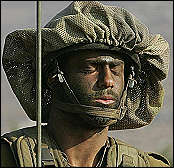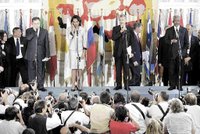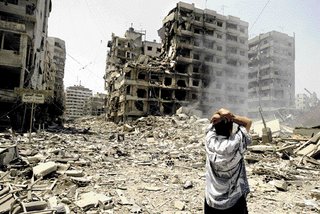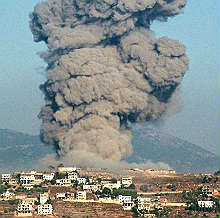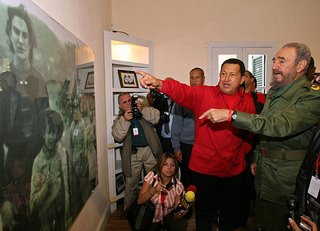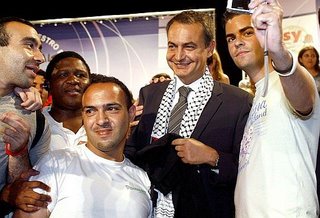If more Catholics were made in the mode of André Mandouze, instead their
Action Française equivalents in the US Supreme Court (Alito, Kennedy, Roberts, Scalia, and Thomas) we'd all be better off for it.
Article orginally published in
Le Monde, 10 June 206
Obituary: André Mandouze, Christian intellectual, Résistance fighter and militant agitator for Algerian independence.
By Henri Tincq
André Mandouze had the good taste to publish his 20th century memoires. He did not wish to leave the task of writing the last word on his life as perennial dissident, raging academic, firey journalist, tempestuous Catholic and a militant on every barricade to anyone else. He defended anti-fascism, anti-colonialism, Algerian independence, Socialist leftism in the mold of François Mitterand, and the reforming Catholic Church of the Vatican II Council.
Full Speed To The Left, By God! This is the title of his volume of Memoirs (1962-1981) published by Cerf in 2003, summarizing his life and work. This polished Latin scholar, a Sorbonne
mandarin, was also an unbowed provocateur with a firey temperament, a saintly man of faith and passion, and an irritable and angry prophet. A great admirer of St. Augustin (354-430), has was, as the Bishop of Hippo Regius (now Anaba, in Algeria) a polemicist; his unsparing pen earned him as many friends as enemies.
Born in Bordeaux on June 10, 1916, the young André Mandouze joined the resistance movements of the 1930’s against Franco and
Action Française aided by a Jesuit, Antoine Dieuzayde, his “old zebra” as he called him, confessor to Catholic Student Youth (JEC). At the
Ecole Normale Supérieure, where he was awarded a degree in Humanities in 1937, he claimed for himself the post of the Left’s Prince of
Talas (students who attended Mass). During the Occupation, as Professor of Humanities in Bourg-en-Bresse (Ain), he is arrested for formenting a student demonstration against the projection of the film,
Süss the Jew, an anti-Semite propaganda film.
He then joined the Underground to integrate Judeo-Christian solidarity networks and became close to spiritual anti-Nazi Resistance figures such as Jean-Augustin Maydieu, one of the founders of the Christian weekly
Seven (banned in 1937 by the Vatican), and Jesuit Pierre Chaillet, which whom he launched
The Journal of Christian Witness and became its first editor-in-chief. For him, spiritual and armed resistance is one in the same.
The spiritual is the bedfellow of the temporal, he liked to say.
With the restoration of peace,
Christian Witness no longer converges with his dreams of a regenerated France. He slams the door shut and flies to Algiers in January 1946, where he becomes a university professor. He knows only one thing about Algeria—that it is the birthplace of St. Augustin, a Berber through his mother, Monnica, and the Doctor in Grace to whom he dedicates his Sorbonne thesis in June 1968.
But he espouses the Algerian nationalist cause and in 1953 founds the periodical,
Algerian Conscience, which is quickly condemned as seditious. André Mandouze is the first academic to agitate for Algerian independence. The called him
Mandouze-fellouze (Mandouze the
fellah). He is a confident of Cardinal Duval, the Archbishop of Algiers, whom the OAS calls
Mohammad bin-Duval and acts as an intermediary between Pierre Mendès-France and the FLN.
In 1956, under the government of Guy Mollet, he is forced to flee Algeria and is interned in
La Santé Prison for three days. But, together with other Catholic intellectuals such as François Mauriac, Louis Massignon, Henri Guillemin, Henri-Irénée Marrou (his mentor in Augustinism), and Pierre-Henri Simon, he continues to rail against torture in
Le Monde, France-Observateur and
The Journal of Christian Witness. In 1981, he becomes the promugator of a thesis on
Torture and Christian Conscience in Algeria, written by Alain de la Morandais.
He doesn’t go easily from Algeria. In 1963, at the request of Ahmed Ben Bella, André Mandouze begins to reorganize the university of the newly-independent country but his career as a "pied rouge" (as progressives were called), ends the project when Colonel Houari Boumediène [hmm, sounds like a US-installed dictator] assumes power. André Mandouze again takes up his professorship at Algiers University before returning to Paris where, for many long years, he commands the stage as the premier Latinist at the Sorbonne.
He will return to Algiers in April 2002 to preside, together with President Bouteflika, over a colloquium on St. Augustin, who for him symbolizes the link between African-ness and universalism. In 2003, he is responsible for the discovery of the works of Saint Augustin by... Gérard Depardieu ("my last student"), who, impassioned by
Confessions, reads them aloud under the direction of Mandouze to an overflowing crowd at Notre-Dame Cathedral.
Throughout his life, this free-thinking “Catho” will cross swords with his own Church, whose compromises with Fascism and Vichy he denounces early on. He makes enemies on the Left (Maurice Clavel) and on the Right (Cardinal Daniélou, Father Bruckberger, Monsignor Lefebre), becomes the bête noire of fundamentalists, and in 1982 (in the pages of the periodical,
La Lettre) fearlessly confronts the new Archbishop of Paris, Cardinal Lustiger, whom he knew as confessor at the Sorbonne. The spiritual offspring of Péguy and de Mounier, André Mandouze will remain close to the Dominican Friars in the move to create an intellectually and socially engaged Christianity against the extremisms of the Right and the Communists.
A man with many connections, he will remain faithful to the inheritors of the weekly,
Seven, which will reemerge as
Current Times, and of the
Journal of Christian Witness, which he accompanies with warmth and vigor as
The World. Beginning in 1956, he is the regular host of the
Petit Riche Breakfasts where Hubert Beuve-Méry, Pierre-Henri Simon, Jean Lacroix, André Frossard and Father Pierre Boisselot are in regular attendance.
But it is in his daily readings of the Gospel that this Christian, a husband and the father of seven children, that he explores its lessons of liberty and rejection of compromise. Disobedience was for him an act of faith. Among his principal works are:
Intelligence and Saintliness in the Early Christian Tradition (Cerf 1962),
History of the Saints and Christian Sainthood (Hachette 1986-1988, the first volume of his
Memoires and
From One Résistance to Another (Viviane Hamy,1998).
Henri Tincq







